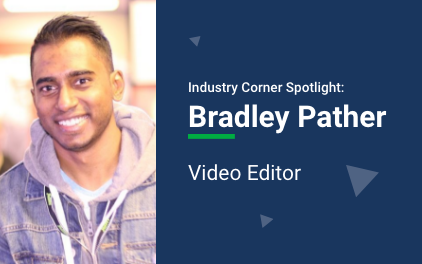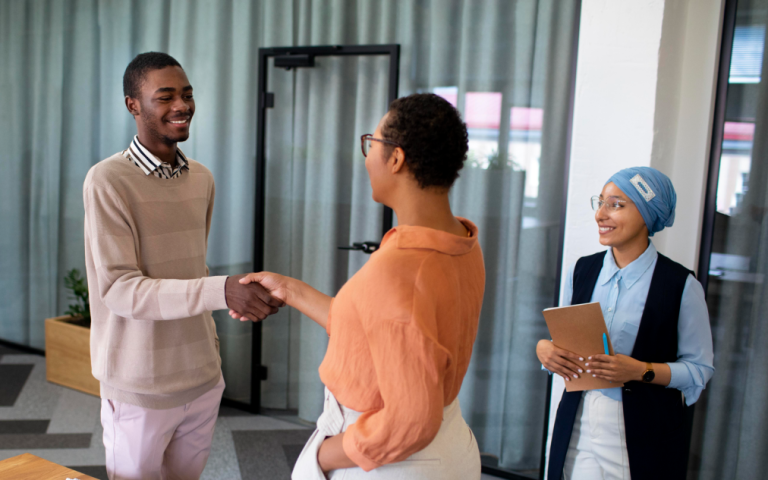Film and television. These are some creative pleasures we all enjoy – the plot, actors, sound and music effects, and how the story moves seamlessly from one scene to the next. This sequence is the work of a video editor. To learn more about this behind-the-scenes storyteller, we went into the Video Editing Industry Corner and spoke to Bradley Pather. Read on to learn more about the field and how you can make your big break.
Introduction and background
Tell us a bit about your experience.
I’ve been in the video production industry for around 15 years. During that time I’ve been fortunate enough to work for companies that cater to different industries, spanning from Wildlife, to Corporate to Entertainment and even Weddings and lifestyles.
What made you decide to pursue a career as a video editor?
Cinema and film were something I’ve always loved while growing up. This led me to think of myself as a bit of a movie buff (totally self-proclaimed) so naturally, when it came time to pick something to study after high school, I chose to do my degree in Television and Film.
What type of video editing do you specialise in?
At the moment I’m specialising in digital content creation for websites and social.
What courses did you take to become a video editor?
I’ve completed a television and film course at DUT and specialised in video editing. Over and above that, a lot of things were self-taught cause the industry is forever changing.
What is your favourite part about video editing?
The creative ways we get to construct and interpret stories.
What is your least favourite part of video editing?
Having to make the hard choices of what makes the edit and what doesn’t, sometimes having to leave some beautiful shots and moments on the cutting room floor.
Video editing
What is video editing?
Video editing is the manipulation and arrangement of video shots to tell a story or present information.
What do you think are the most important skills for a video editor?
Attention to detail, a creative flare and a strong ability to problem solve.
What do you think is the most difficult part of being a video editor?
For me personally, it would be dealing with revisions and feedback. Video editing is a collaborative process and editors often need to make changes based on feedback from clients or other stakeholders. It can be challenging to incorporate these revisions while still maintaining the overall vision and quality of the project.
How do you approach a video editing project?
I have a systematic way of approaching my edits.
- Understanding the project requirements.
- Organising footage and any assets needed.
- Create a rough cut.
- Do refinements.
- Final touches.
- The feedback and revisions.
What do you think is the most important part of the video editing process?
I would say it’s storytelling. Video editing is not just about putting together different shots or scenes; it’s about telling a story, conveying a message, or evoking emotions through visuals and audio. While technical skills are crucial in video editing, storytelling is what separates an excellent video editor from an average one.
What do you think are the biggest challenges facing video editors during the editing process?
I think every video editor is different and unique so the challenges vary accordingly, to the individual’s strengths and weaknesses. I’ve worked with editors that struggle to maintain consistency across their edits, and I’ve also seen editors struggle with managing time effectively. It does vary.
Technical questions
How important is it to stay updated about new trends and tools?
Staying updated is crucial for video editors who want to remain competitive and deliver high-quality work to their clients. It’s overall going to keep you relevant in the game.
What makes a perfect visual story?
There are a few things that would make a good visual story (I’m not sure if there is such a thing as a ‘perfect visual story’). I’d say it’s a combination of visual appeal, emotional engagement, clear messaging and narrative structure as also the pacing of the piece as well as the attention to detail.
What do you think are the most important features of good video editors?
Some of the most important features would be things like creativity, adaptability, solid technical ability, great communication skills overall and definitely being able to collaborate.
What are the best video editing software apps and tools you need as a video editor?
The industry standard would be Premiere Pro (Definitely worth knowing other Creative Suit apps, such as After Effects, Photoshop etc.) Final Cut, Avid Media Composer, DaVinci Resolve.
A day in the life of a video editor:
What specific duties have you performed as a video editor?
Over my time in post-productions, I’ve gotten to perform all of them.
- Reviewing raw footage and selecting the best takes to use.
- Trimming footage and arranging it to tell a compelling story.
- Insert elements that would enhance the final product.
- Audio levels and colour grading.
- Incorporating client feedback and making changes to the final.
What is the one skill that is very important to inculcate as a video editor?
I think one of the skills that undoubtedly needs to be instilled in a video editor is problem-solving. Very often we can get bogged down by a shot that wasn’t captured correctly, a piece of audio that is corrupted/missing, or maybe that shadow being cast on the subject is too noticeable. In cases like these, we have to be able to problem-solve and move on with the edit as best we can. Problem-solving and making a strong cup of coffee.
Describe your daily routine as a video editor.
For most people in production, the day always starts with coffee. The more intense the edit the stronger the caffeine. I then normally would take a few mins to check and reply to emails, and watch a YT video or two (You can often find inspiration from something random you might see on YT or Social media). And then continue or get started with my edits. During my edit process, I tend to take small breaks in between, as I find fresh eyes can often spot issues you may not have seen earlier.
What kind of strategies and mindset are required for this role?
Different people will gravitate to strategies and mindsets that will work for them. For me, I try to be very planned out in my approach. I often have a list that I create at the start of the day and will try to finish tasks in my edit before I take a break. Then when I’m back from my break, I’ll watch my edit (or the previously worked-on section) and, if I’m happy, move on to my next item on the list. I find that this approach allows me to check myself and my work as I move along without letting things slip through the cracks and also guides me with time management.
What is the biggest challenge that you foresee in this job?
As of late many people see A.I as replacing creatives in the industry is a huge challenge. While A.I has been really impressive and I sometimes make use of it myself. Having a real-life video editor who can deal with a client either face to face, over a phone call or by email is something that can’t be replaced. Human interaction in production is what makes the end result magical.
Getting started as a video editor:
How long does it take to become a video editor?
The time it takes to become a video editor can vary depending on several factors, such as the type of editing work you want to pursue, your existing skills, and the amount of time and effort you’re willing to dedicate to learning and practising video editing.
What is the golden rule of editing?
One of the rules I was taught over the years would be ‘Show, don’t tell’ I’m not sure if this could be regarded as the ‘Golden Rule’ but definitely an important rule. The basis of the rule is that instead of simply telling the audience what is happening or how a character is feeling, the editor should use visual and auditory cues to convey the same information.
How do I start editing videos with no experience?
The best way I found is just to get stuck in. We thankfully live in an age where there are a ton of helpful tutorials online, and places like Alison that can assist with learning tricks and techniques. Experiment, play around and practice.
Final thoughts
The most remarkable moment in your career so far?
Definitely, moments that stand out for me would be getting to travel to the Philippines and Samoa, where I worked on two seasons of Survivor.
What are the possible career paths for someone who has completed (or is about to complete) their video editing qualification?
Ultimately the path will depend on your interest, skills and goals. You could gravitate more towards broadcast and TV, alternatively, maybe you see yourself in advertising or digital and social media marketing companies. Other options could be corporate or education-based editing, post-production houses or independent filmmaking.
What tips do you have for someone just starting out in video editing?
As cliché as this is going to sound, I think just being ‘patient and persistent’. Skill and understanding will develop over time. Also never stop learning, keep adding to your bag of tricks and you’ll eventually become an editing wizard.
If you have an eye for story-telling, want to move from making home videos to editing content for the big screen and pursue a career as a film and video editor, then enrol for any of Alison’s video editing courses. And then touch up your resume with our free Resumé Builder tool to send with your portfolio to apply for that dream role.









